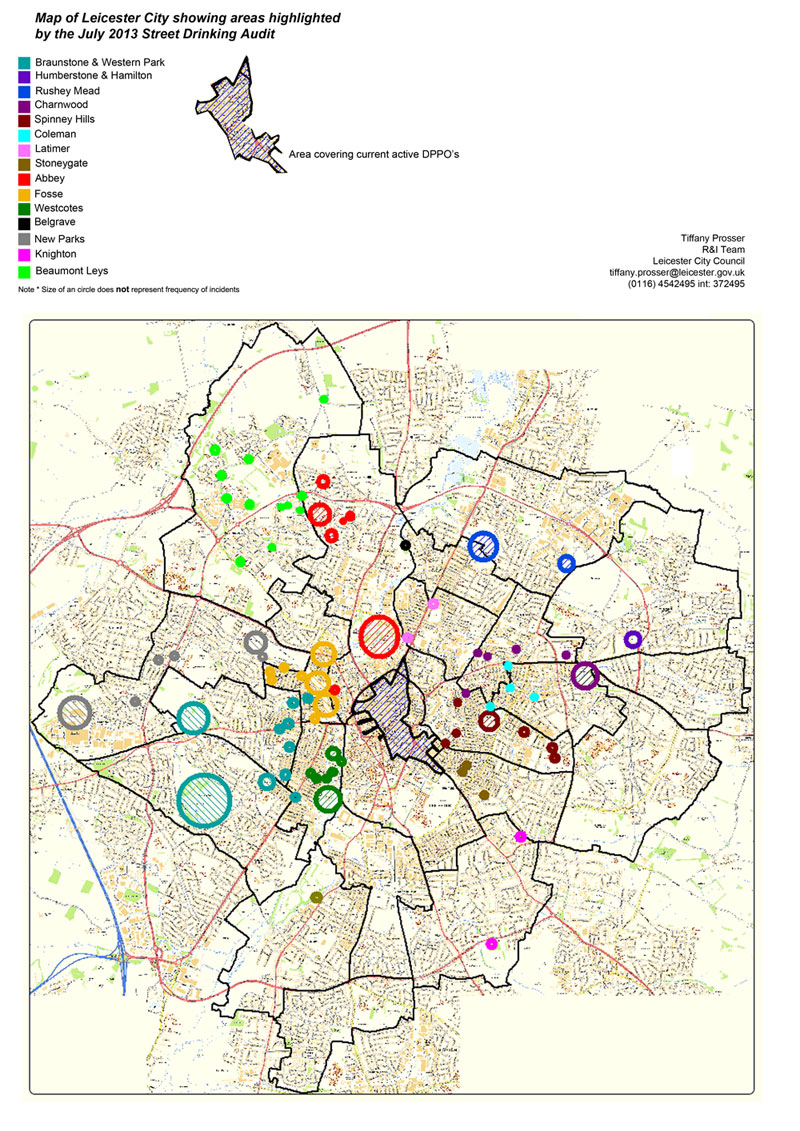Street Drinking
Feedback updated 8 Jan 2015
We asked
You said
We did
Results updated 8 Jan 2015
Due to a national legislative change - the DPPO became the PSPO, and required us to conduct a further round of consultation. The results of both consultations and subsequent decisions and actions are available here: https://consultations.leicester.gov.uk/city-development-and-neighbourhoods/street-drinking2
Overview
Leicester City Council is considering using its powers under the Criminal Justice and Police Act 2001 to make a Designated Public Place Order (DPPO) for areas within the city boundary. We have used information gathered from city wardens, parks services, play services, cleansing services, police neighbourhood teams, and residents to find out where street drinking is thought to be an issue.
A recent audit report in Leicester (Street Drinking Audit, July 2013) showed that there are 106 street drinking hotspots across the city and approximately 15% of these occur in the city centre. Residents have raised concerns with us about irresponsible drinking of alcohol leading to anti-social or nuisance behaviour in public areas. This indicates that street drinking is significant enough for Leicester City Council to consider and implement a city-wide Designated Public Place Order (DPPO).

Why your views matter
The DPPO gives police additional powers within a designated area to tackle street-drinking where there is associated anti-social behaviour (ASB).
A Police Officer or Police Community Support Officer can in a designated area:
- Require a person not to consume alcohol
- Require a person to surrender any alcohol in his/her possession
- Dispose of the alcohol
- Arrest an individual if they fail to comply with the Officer’s request and/ or fine the individual for up to £500
The DPPO does not represent a ban on public drinking; it allows for greater control of drinking where it is of a problematic nature – e.g. large groups of drinkers intimidating residents/passers-by.
We need to consult with the public to establish exactly where street drinking is an issue, what problems it is causing and whether a city-wide order is supported by residents. If it is supported, we intend to implement the order by the end of September 2014.
For more information on DPPO's, please take a look at the frequently asked questions available as a PDF for download below.
Areas
- Abbey
- Aylestone
- Beaumont Leys
- Belgrave
- Braunstone Park & Rowley Fields
- Castle
- Evington
- Eyres Monsell
- Fosse
- Humberstone & Hamilton
- Knighton
- Rushey Mead
- Saffron
- Spinney Hills
- Stoneygate
- Thurncourt
- Westcotes
Audiences
- Children and young people
- Working-age people
- Older people
- Carers
- Full-time and part-time workers
- Disabled people
- Older households (65+)
- Single people
- Families with children
- Couples
- All households
- Faith groups
- Sports clubs
- Youth clubs
- Carers' network
- Trade unions
- Voluntary organisations
- Community organisations
- Self-help groups
- User groups
- Third sector infrastructure groups
- All Voluntary and Community Organisations
- Advocacy organisation
- Police
- NHS
- FE colleges
- Universities
- Schools
- Businesses
- All Public and Private Organisations
- Directors
- Heads of service
- Managers, team leaders and supervisors
- Professionals
- All staff
- Service users
- Care home residents and their next of kin
Interests
- Community safety

Share
Share on Twitter Share on Facebook